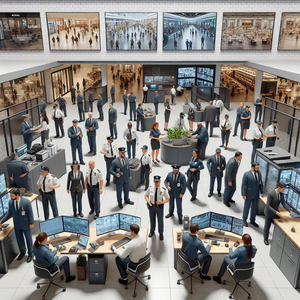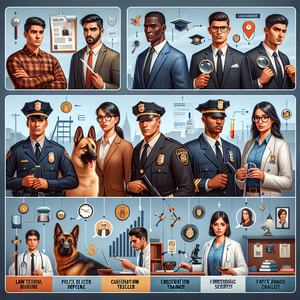
A Detailed Exploration of 20 Security Guard Positions: Duties, Skills, and Career Insights
In today's world, where safety is a top priority, the need for security professionals has never been greater. This guide provides a thorough examination of various security guard roles, ranging from unarmed and armed guards to specialized positions within unique environments like events and residential areas. Each role plays a vital part in maintaining safety and order, catering to the distinct needs of clients and settings.
Job Summaries:
Unarmed Security Guard:
- Unarmed security guards serve as the first line of defense.
- They monitor premises and conduct patrols in various environments such as retail stores and corporate offices.
- Strong observational and communication skills are essential for success.
- A high school diploma is common, but relevant training can boost employability.
- This role is projected to grow by about 6% in the next decade.
- The role highlights its importance in crime deterrence and customer reassurance.
Armed Security Guard:
- Armed security guards are responsible for maintaining safety in high-risk settings, such as banks and jewelry stores.
- They carry firearms and other defensive tools.
- Candidates must have a valid firearm permit.
- Candidates must complete specialized training.
- The average salary for armed guards is typically higher due to the increased risks involved.
- Their presence is a significant deterrent to criminal activity.
Mobile Security Patrol Officer:
- Mobile patrol officers provide flexible security measures by patrolling assigned areas, either on foot or in vehicles.
- This role requires strong problem-solving skills and a valid driver’s license.
- Their ability to respond quickly to incidents makes them invaluable to organizations needing adaptable security solutions.
Event Security Officer:
- Event security officers focus on safety management at gatherings, including concerts and corporate events.
- Their responsibilities encompass crowd control and emergency response planning.
- Strong interpersonal skills are necessary to maintain order while interacting positively with attendees.
- Training in emergency procedures is often required.
Residential Security Officer:
- Residential security officers ensure the safety of communities by monitoring access points and addressing resident inquiries.
- A background in security or law enforcement is beneficial, along with excellent communication skills.
- This role builds trust within the community, offering peace of mind to residents.
Corporate Security Officer:
- Corporate security officers safeguard company assets and confidential information through risk assessments and implementing security protocols.
- A bachelor’s degree in criminal justice or a related field is often preferred.
- This position is critical for maintaining a secure workplace and enhancing operational efficiency.
Surveillance Operator:
- Surveillance operators play a crucial role in monitoring video feeds for suspicious activities.
- They require keen attention to detail and analytical skills, as their observations can prevent crimes.
- A high school diploma and familiarity with surveillance technology are typically required.
Construction Site Security Officer:
- Construction site security officers protect sites from theft and vandalism.
- They conduct regular patrols.
- They ensure compliance with safety regulations.
- A background in security or construction management is advantageous.
- This role is vital for preventing financial losses and project delays.
Retail Security Officer:
- Retail security officers focus on preventing theft while ensuring a safe shopping environment.
- They monitor customer behavior and collaborate with law enforcement when necessary.
- A high school diploma is commonly required, and prior experience can be beneficial.
Bodyguard:
- Bodyguards provide personal protection to high-profile individuals.
- They protect celebrities and executives.
- Responsibilities include threat assessment and travel coordination.
- Requires extensive training in self-defense and crisis management.
Security Consultant:
- Security consultants assess organizational vulnerabilities and recommend improvements.
- They conduct risk assessments and develop security plans.
- This role is suitable for those with a background in security management and strong analytical skills.
Access Control Specialist:
- Access control specialists manage entry to secure facilities.
- Ensuring that only authorized personnel access sensitive areas.
- This role is essential for data protection and maintaining security protocols.
- Candidates often need experience with various access control technologies.
Crowd Control Officer:
- Crowd control officers manage large groups during events to maintain order and safety.
- Strong communication skills are vital for this role.
- The ability to remain calm under pressure is essential for this role.
- This role is essential for the smooth execution of public gatherings.
Security Trainer:
- Security trainers design and conduct training programs for security personnel on best practices and legal regulations.
- A background in security management is crucial for success in this role.
Security Dispatcher:
- Security dispatchers coordinate incident responses and communicate with on-ground personnel.
- Excellent communication and multitasking abilities are essential.
- This role is key to ensuring quick responses to security incidents.
Personal Security Assistant:
- Personal security assistants help individuals plan safe routes and manage schedules.
- They ensure safety during travel.
- Strong organizational skills are important for this role.
- Previous security experience is also important.
Safety and Security Manager:
- Safety and security managers oversee security departments.
- Developing policies and managing personnel.
- A bachelor's degree and extensive experience in security management are typically required to excel in this role.
Cybersecurity Officer:
- Cybersecurity officers protect digital assets from cyber threats by developing and enforcing security protocols.
- A strong IT security background and relevant certifications are essential.
- This role is increasingly important in today’s digital landscape.
Security Risk Assessor:
- Security risk assessors evaluate potential threats and vulnerabilities within organizations.
- Strong analytical skills and experience in security management are necessary for this role.
- This role is crucial for creating effective risk mitigation strategies.
Industrial Security Officer:
- Industrial security officers protect manufacturing facilities from theft and accidents.
- They conduct inspections and ensure compliance with safety regulations.
- Candidates usually require a background in industrial security.
This detailed exploration highlights the myriad roles available in the security industry, emphasizing the unique contributions each position makes to overall safety. With significant growth anticipated in the sector, understanding these roles can help individuals identify their interests and potential career paths. For those considering a career in security, it’s essential to research educational requirements, potential certifications, and the skills necessary to excel in your chosen role. As the industry continues to evolve, staying informed about trends and opportunities will be vital for success.
Explore More Jobs

